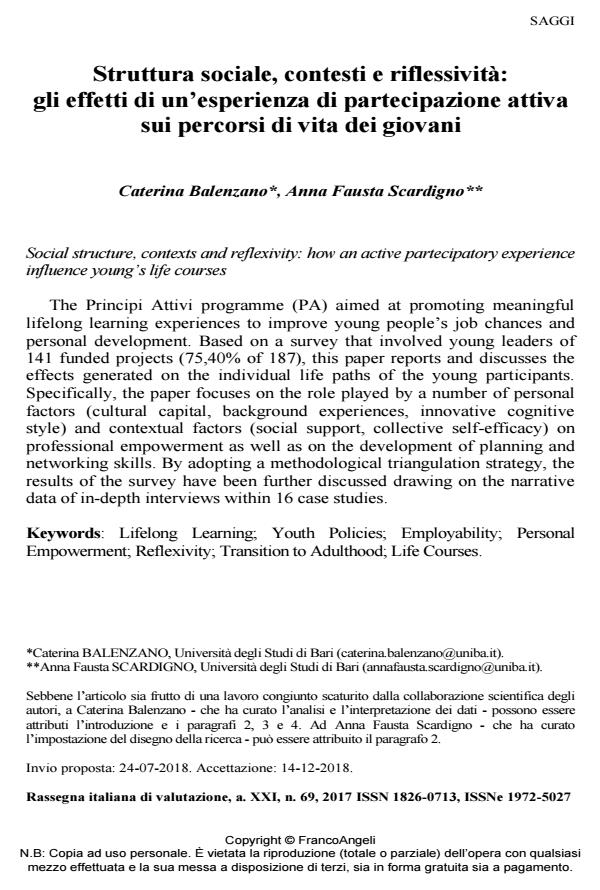Social structure, contexts and reflexivity: how an active partecipatory experience influence young’s life courses
Journal title RIV Rassegna Italiana di Valutazione
Author/s Caterina Balenzano, Anna Fausta Scardigno
Publishing Year 2019 Issue 2017/69 Language Italian
Pages 24 P. 33-56 File size 465 KB
DOI 10.3280/RIV2017-069003
DOI is like a bar code for intellectual property: to have more infomation
click here
Below, you can see the article first page
If you want to buy this article in PDF format, you can do it, following the instructions to buy download credits

FrancoAngeli is member of Publishers International Linking Association, Inc (PILA), a not-for-profit association which run the CrossRef service enabling links to and from online scholarly content.
The Principi Attivi programme (PA) aimed at promoting meaningful lifelong learning experiences to improve young people’s job chances and personal development. Based on a survey that involved young leaders of 141 funded projects (75,40% of 187), this paper reports and discusses the effects generated on the individual life paths of the young participants. Specifically, the paper focuses on the role played by a number of personal factors (cultural capital, background experiences, innovative cognitive style) and contextual factors (social support, collective self-efficacy) on professional empowerment as well as on the development of planning and networking skills. By adopting a methodological triangulation strategy, the results of the survey have been further discussed drawing on the narrative data of in-depth interviews within 16 case studies.
Keywords: Lifelong Learning; Youth Policies; Employability; Personal Empowerment; Reflexivity; Transition to Adulthood; Life Courses.
- Altieri, L. (2009). Valutazione e partecipazione. Metodologia per una ricerca interattiva e negoziale: Metodologia per una ricerca interattiva e negoziale. Milano: FrancoAngeli.
- Archer, M. S. (2009). Riflessività umana e percorsi di vita. Come la soggettività umana influenza la mobilità sociale. Trento: Edizioni Erickson.
- Balenzano C., Ieracitano F. (2016). I giovani e la famiglia tra precarietà professionale e sviluppo identitario.In Pacelli D. (a cura di), Il discorso sulla famiglia. Problemi e percezioni di una realtà in movimento. Milano: FrancoAngeli.
- Bepa – Bureau of European Policy Advisers 2010. Empowering People, Driving Change: Social Innovation in the European Union. European Commission, Luxembourg: Publication Office of the European Union.
- Bertolini, S. (2012). Flessibilmente giovani. Percorsi lavorativi e transizione alla vita adulta nel nuovo mercato del lavoro. Bologna: Il Mulino.
- Bichi, R. (2002). L’intervista biografica. Una proposta metodologica. Milano: Vita e pensiero.
- Denzin, N. K. (1997). Triangulation in educational research. Educational research, methodology and measurement: An international handbook, 318-322.
- D’Odorico, L., Cassibba, R. (2002). Osservare per educare. Firenze: Carocci.
- Donati P. (2003). Famiglia e capitale sociale nella società italiana, Edizioni San Paolo, Cinisello Balsamo.
- Ekman, J., & Amnå, E. (2012). Political participation and civic engagement: Towards a new typology. Human affairs, 22(3), 283-300.
- EUROSTAT (2015). Being young in Europe today. Publications Office of the European Union. Statistical Office of the European Communities.
- Giddens, A., Sutton, P. W. (2014). Fondamenti di sociologia. Bologna: Il Mulino.
- Granheim, U. H., & Lundman, B. (2004). Qualitative content analysis in nursing research: Concepts, procedures and measures to achieve trustworthiness. Nurse Education Today, 24, 105–112.
- Jans, M., De Backer, K. (2002), Youth (-work) and social participation. Elements for a practical theory. Flemish Youth Council, Brussels.
- Kirton, M. (1976). Adaptors and innovators: A description and measure. Journal of Applied Psychology, 61(5), 622-629.
- Mannarini, T. (2004). Comunità e partecipazione. Prospettive psicosociali. Milano: Franco Angeli.
- Merico, M. (2016). La (controversa) partecipazione di Paul G. Cressey ai Payne Fund Studies. In Paul. G. Cressey Giovani, cinema, educazione (pp. 7-28). Milano: Mimesis.
- Morciano, D., & Merico, M. (2017). Critical Youth Work for Youth-Driven Innovation: A Theoretical Framework. In Youth as Architects of Social Change (pp. 43-74). Palgrave Macmillan, Cham.
- Morciano, D. (2015). Spazi per essere giovani. Una ricerca sulle politiche di youth work tra Italia e Inghilterra. Milano: FrancoAngeli
- Moro, G. (2005). La valutazione delle politiche pubbliche. Roma: Carocci
- Scardigno, A. F., & Manuti, A. (2011). Giovani che partecipano. Una ricerca sulle politiche giovanili della regione Puglia. Roma: Aracne.
- Wong, N. T., Zimmerman, M. A., & Parker, E. A. (2010). A typology of youth participation and empowerment for child and adolescent health promotion. American Journal of Community Psychology, 46(1-2), 100-114.
- Zimmerman, M. A. (1995). Psychological empowerment: Issues and illustrations. American journal of community psychology, 23(5), 581-599.
Caterina Balenzano, Anna Fausta Scardigno, Struttura sociale, contesti e riflessività: gli effetti di un’esperienza di partecipazione attiva sui percorsi di vita dei giovani in "RIV Rassegna Italiana di Valutazione" 69/2017, pp 33-56, DOI: 10.3280/RIV2017-069003